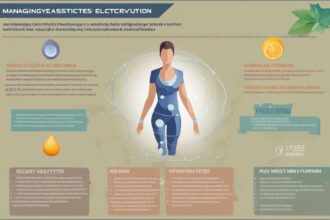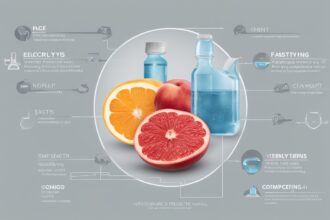Hey there, fasting enthusiasts! If you’ve ever embarked on a fasting journey—whether it’s intermittent fasting, a water fast, or an extended fast—you’ve probably heard about the importance of electrolytes fasting balance. Electrolytes are the unsung heroes of our body’s hydration and energy systems, and they become even more critical when you’re abstaining from food. Without proper electrolyte management, you might experience fatigue, headaches, or muscle cramps, which can derail your fasting goals. In this post, we’ll dive deep into why electrolytes matter during fasting, how to maintain them, and practical tips to keep you feeling your best. Let’s explore how to make electrolytes and fasting work hand in hand for optimal health!
What Are Electrolytes and Why Do They Matter in Fasting?
Electrolytes are minerals in your body that carry an electric charge and play a vital role in maintaining hydration, nerve function, and muscle activity. The key players include sodium, potassium, magnesium, and calcium. When you’re eating a regular diet, you naturally replenish these through food and drinks. However, during fasting, your body doesn’t get the same consistent supply, which can lead to an imbalance. This is where electrolytes fasting strategies come into play. Without food, your body may excrete more sodium and other minerals through urine, especially if you’re doing a water fast or following a low-carb diet before fasting. Keeping these levels stable is essential to avoid symptoms like dizziness or the dreaded “keto flu” often associated with fasting.
How Fasting Impacts Electrolyte Balance
Fasting, especially for extended periods, can significantly affect your electrolyte levels. When you fast, insulin levels drop, which signals your kidneys to excrete more sodium and water. This is why you might notice frequent urination in the first few days of a fast. Along with sodium, you lose potassium and magnesium, which can lead to an imbalance if not addressed. Research shows that low electrolyte levels during fasting can cause symptoms like fatigue, headaches, and even heart palpitations in extreme cases. Understanding this connection between fasting and electrolytes is crucial for anyone looking to fast safely. The goal is to support your body’s natural processes without breaking your fast.
Common Symptoms of Electrolyte Imbalance During Fasting
Ever felt sluggish or foggy-headed a few days into a fast? That could be a sign of low electrolytes. Here are some common symptoms to watch out for when fasting:
- Fatigue: Feeling unusually tired or weak, even without physical exertion.
- Headaches: Often linked to dehydration and low sodium levels.
- Muscle Cramps: A sign of insufficient potassium or magnesium.
- Dizziness: Can occur when sodium and water balance is off.
- Irritability: Electrolyte imbalances can affect mood and mental clarity.
Recognizing these signs early can help you take action before they worsen. The good news? Managing electrolytes while fasting is easier than you might think with the right approach.
Practical Tips to Maintain Electrolytes During Fasting
So, how do you keep your electrolytes in check without breaking your fast? The key is to focus on hydration and strategic supplementation. While you can’t eat during a true fast, certain zero-calorie or minimal-calorie options can help. Here are some actionable tips to maintain electrolyte balance fasting:
- Drink Plenty of Water: Hydration is the foundation. Add a pinch of high-quality sea salt to your water for a sodium boost.
- Use Electrolyte Supplements: Look for sugar-free, fasting-friendly powders or tablets with sodium, potassium, and magnesium.
- Sip on Bone Broth (if allowed): For less strict fasts, bone broth is a fantastic source of natural electrolytes.
- Monitor Your Body: Pay attention to how you feel and adjust your intake if you notice symptoms of imbalance.
These small tweaks can make a huge difference in how you feel during your fast. Remember, the goal of fasting electrolytes management is to support your body, not to overcomplicate things.
The Science Behind Electrolytes and Fasting Benefits
Let’s geek out for a moment on the science of electrolytes fasting. Electrolytes are critical for cellular function, especially during fasting when your body switches to burning fat for fuel (ketosis). Sodium, for instance, helps regulate blood pressure and fluid balance, while potassium supports nerve signals and muscle contractions. Magnesium is a cofactor in over 300 enzymatic reactions, including energy production. Studies, such as those published in the Journal of Clinical Investigation, highlight that maintaining electrolyte balance during fasting can reduce oxidative stress and improve metabolic flexibility. This means your body adapts better to using stored fat for energy, one of the key benefits of fasting. So, by prioritizing electrolytes during fasting, you’re not just avoiding discomfort—you’re enhancing the process at a cellular level.
When and How to Replenish Electrolytes Post-Fast
Breaking a fast is just as important as the fast itself, and replenishing electrolytes should be a priority. After a prolonged fast, your digestive system is sensitive, so you don’t want to overwhelm it with heavy meals or high-sugar drinks. Start with small, nutrient-dense foods and electrolyte-rich options. Sip on coconut water for natural potassium and magnesium, or have a light broth to ease back into eating. Avoid processed sports drinks packed with sugar, as they can spike insulin and undo some of the metabolic benefits of fasting. Timing-wise, focus on replenishing electrolytes after fasting within the first hour of breaking your fast to help your body recover and rehydrate effectively. A balanced approach here ensures you maintain the gains from your fasting efforts.
As we wrap up, it’s clear that electrolytes fasting is a game-changer for anyone looking to fast safely and effectively. Whether you’re a beginner or a seasoned faster, understanding how to manage your electrolyte levels can prevent common pitfalls like fatigue and cramps, while maximizing the benefits of fasting. Remember to listen to your body, stay hydrated, and use fasting-friendly strategies to keep your minerals in balance. By prioritizing electrolytes and fasting, you’re setting yourself up for success—both during and after your fast. So, next time you embark on a fasting journey, keep these tips in mind and share your experiences with us. How do you maintain your electrolyte balance while fasting? Let’s keep the conversation going!






